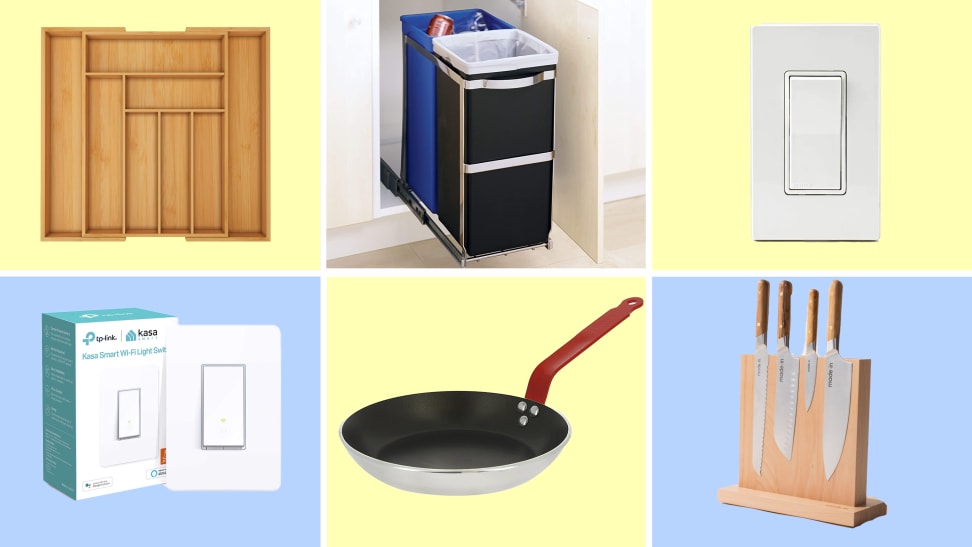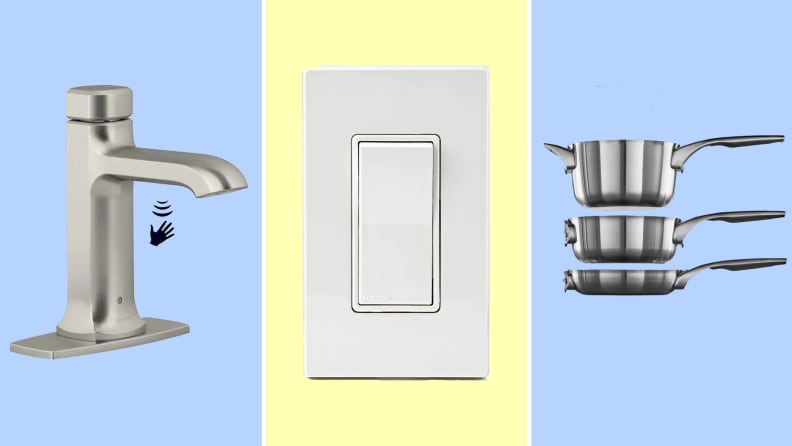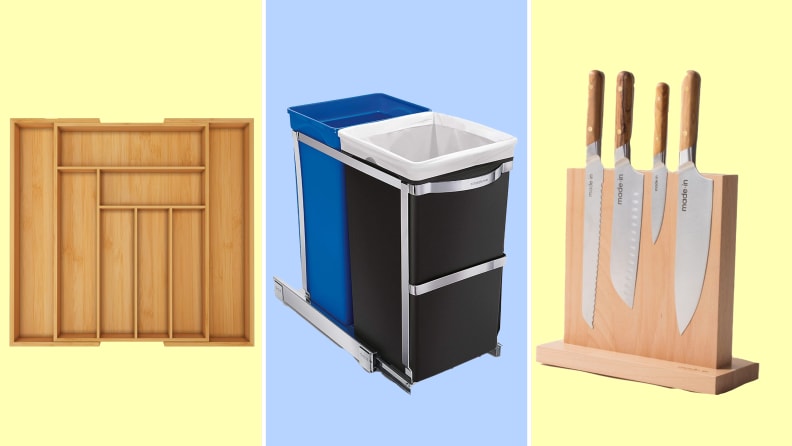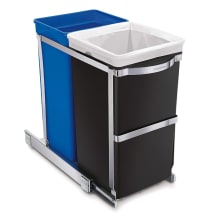5 aging-in-place remodeling ideas for the kitchen
Make the kitchen accessible for all abilities
 Credit:
Reviewed / Utopia Kitchen / Simplehuman / Leviton / Kasa / De Buyer / Made In
Credit:
Reviewed / Utopia Kitchen / Simplehuman / Leviton / Kasa / De Buyer / Made In
Products are chosen independently by our editors. Purchases made through our links may earn us a commission.
Anyone who’s built or renovated a home kitchen knows it’s no small lift when it comes to budget or effort. But the good news, say aging-in-place specialists, is there are plenty of smaller aging-in-place remodeling ideas that won’t break the bank for seniors or the disabled who want to continue living at home independently instead of transferring to an assisted living facility.
1. Add lighting above and below

Visibility is critical to home safety regardless of whether you're cooking meals or navigating the living space.
Adding lighting to any aging-in-place-appropriate kitchen is important to enhance visibility when slicing and dicing—and to prevent slips and falls should floors get slippery, says Katie Finn of Patrick A. Finn Custom Homes and Remodeling in Illinois. “Make sure every area of the kitchen has spotlighting,” she adds. “This is particularly important in naturally shadowed and dim areas, like under the cabinets and in the pantry.”

Illumiate dark common areas with the power of Maylit Under Cabinet Lights, which can operate on a useful timer system.
Danise Levine, a certified aging-in-place architect and assistant director of the IDEA Center (Center for Inclusive Design and Environmental Access) at the University of Buffalo, recommends installing task lighting below upper kitchen cabinets and adding floor-to-ceiling pantry cabinets. “It’s inevitable that some traditional cabinets may be located out of reach,” she says.
“If items are stored out of reach, meaning whether they are too high or too low, it could require someone to over-extend themselves, develop back issues, or create a dangerous situation where they need to use a stool.”
2. Low-gloss floors
Finn recommends a floor with a lower gloss to reduce the glare from lights, especially hardwood. This list of ADA-compliant flooring options from Flooring Inc features durable yet soft materials tailored to reduce hip, knee, and ankle pain, she says.
Part of Finn’s aging-in-place checklist also includes leveling floors—mainly by removing thresholds between rooms—and removing throw rugs, which can be a trip hazard.
3. Maximize dexterity in switches and handles

These items offer handy kitchen solutions and look great doing it.
One of the easiest ways to update the kitchen of someone who may be losing grip strength is to replace traditional switches with rocker switches, says Finn. And installing drawer pulls with wide, soft, and curved edges is another easy switch.

Rocker switches require less grip to operate.

Large handles make cabinets a cinch to open.
“You may also want to consider automated lighting that turns on every time you enter the room,” she suggests.

Motion-sensor lighting is intuitive, so it’s aware of you as soon as you step into a room—no need to fumble for a light switch.
Her other frequent aging-in-place remodeling recommendation is a sensor sink. “Consider treating yourself to a hands-free faucet with an anti-scald device. Automated soap dispensers and sinks with narrower and shallower basins are also a good way to prevent back pain from leaning over too far,” she advises.

Touchless faucets make this central spot for kitchen activity simple to access.
Levine says seniors may want to invest in new cookware with easy-to-grip handles. “Something that’s lightweight, but also durable with aluminum, is good for older adults who may have loss of strength or suffer from arthritis. The handle should also stay cool during the cooking process to provide protection from burns,” she says.
Our Reviewed-approved best cookware set from GreenPan has a unique triangular handle that cradles nicely in the hand to prevent slipping.


This cookware set has a unique handle that makes it easy to grip.
“For organizational purposes, another thing to consider is that cookware that can be stacked provides space-saving properties in the cabinet or pantry,” so that seniors don’t have to bend and reach in awkward positions, Levine says.
4. Place work areas close together
Those with accessibility challenges who anticipate living at home for many years and will get a high return on investment should consider a full kitchen remodeling project or larger home modification, says Levine.
“There are typically three primary task areas in a kitchen, and those include the refrigerator, sink, and stove. Each of these items should be located within close proximity,” she says. “This can be accomplished utilizing a design concept called the ‘work triangle,’ which describes the imaginary shape the three task areas form when properly located. Each leg of the triangle should be between 4 to 9 feet, and the total length of the three sides added together should be 26 feet or less.”
Finn advises using ADA guidelines, which recommends all or at least a portion of countertops are set at 28 or 30 inches high to make them wheelchair accessible. Wider doorways, slip-resistant floor mats, and smart light switches may also be helpful.

A non-slip floor mat will keep you standing tall on potentially slick surfaces.

This Kasa light switch allows you to control your home’s lighting through voice or the Kasa app.
5. Respect the small details

The best way to make your kitchen more efficient—or less cluttered—is with space saving items.
The most convenient place to locate a trash bin is near the sink and cooking area for kitchen prep waste collection, says Levine. She prefers a pull-out trash can side-by-side with a recycling bin within a lower cabinet for seniors’ ease.

If you’re limited in storage, try storing your trash and recycling in kitchen cabinets. This 9.3-gallon option keeps your trash out of sight.
For safety and organizational purposes, Levine advises drawer organizers with dividers, and also putting all knives in a butcher block to eliminate accidental wounds when accessing kitchen drawers.

This handy product helps keep your silverware right where you want it.


